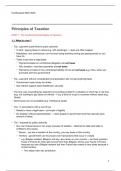Resume
Full summary - Principles of Taxation
- Cours
- Principles of Taxation
- Établissement
- Katholieke Universiteit Brussel (KUB)
Full summary of the course Principles of Taxation in third year of bachelor in Business Administration at the KUB
[Montrer plus]



